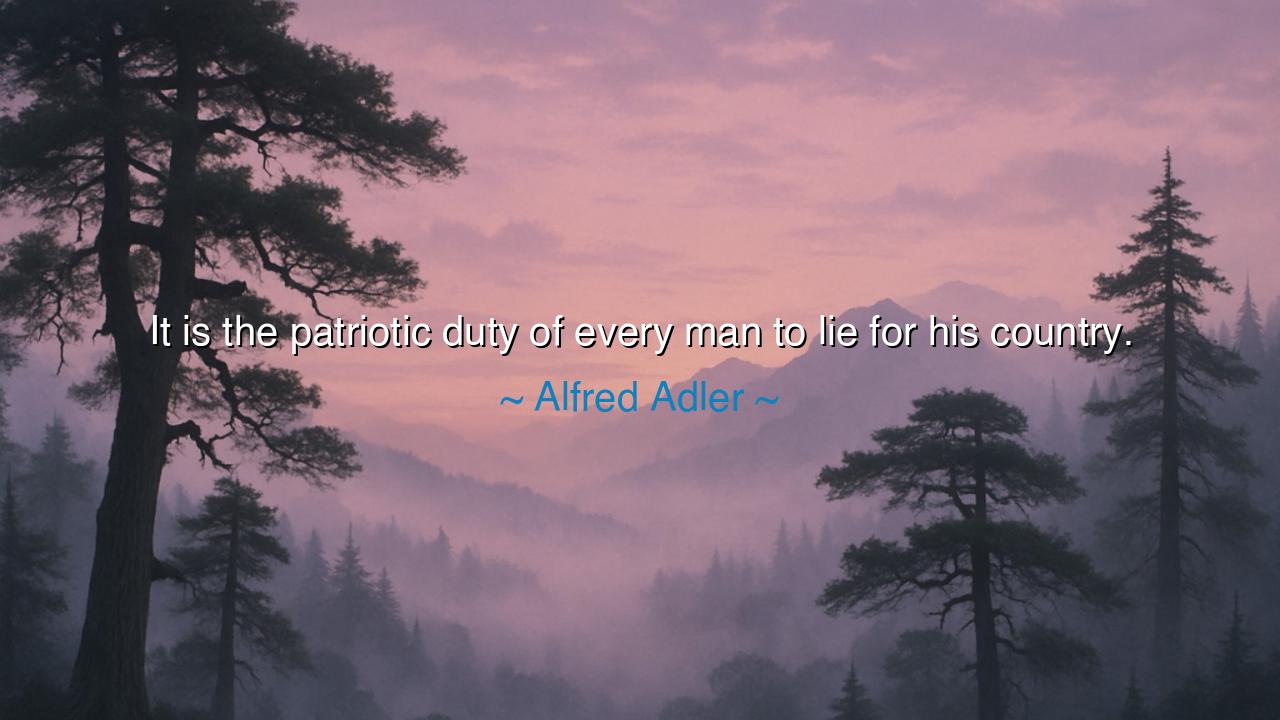
It is the patriotic duty of every man to lie for his country.






Hearken, children of the future, and attend to the provocative words of Alfred Adler, who declared, “It is the patriotic duty of every man to lie for his country.” In this stark declaration lies a contemplation of the complex, shadowed terrain of loyalty and duty. Adler forces the mind to wrestle with a tension that has echoed through the ages: the reconciliation of personal morality with the obligations one owes to the nation. Patriotism, he suggests, is not always a matter of transparent truth, but sometimes of strategic deception for the preservation of the homeland.
The origin of this reflection arises from Adler’s life amid the social and political upheavals of early twentieth-century Europe, where nations faced existential threats and individuals were often compelled to navigate moral ambiguity for the sake of survival and collective good. In times of war, espionage, and political struggle, the patriotic duty may require acts that contradict ordinary ethical norms, presenting citizens with the question: when does service to the country justify subterfuge or concealment?
Consider the historical example of the allied codebreakers during World War II, whose work required secrecy, deception, and misdirection to safeguard nations and lives. Officers and civilians alike engaged in clandestine operations, withholding or altering truth to protect the homeland and ensure strategic advantage. In this context, lying became not a moral failing but a conscious, disciplined act of service, embodying the very sense of duty Adler envisions—a tension between ethics and patriotic obligation.
Adler’s reflection also illuminates the moral weight of such actions. To lie for one’s country is not a frivolous choice, nor an act of malice; it is a burdensome responsibility, undertaken only with full awareness of its consequences. It demands wisdom, restraint, and the courage to act in ways that ordinary morality might not sanction, yet which preserve life, security, or liberty. Patriotism in this sense becomes an active, often morally complex commitment rather than a mere sentiment or ceremonial loyalty.
In modern reflection, this insight resonates in intelligence, diplomacy, and leadership, where truth must be balanced against strategy and survival. Ethical judgment is required: lies for patriotic purposes must serve the greater good, protect innocents, and uphold the enduring principles of the nation. Blind deceit or selfish manipulation in the name of country, however, is corruption masquerading as loyalty. Adler’s words compel discernment, teaching that patriotism is intertwined with moral responsibility.
From this reflection flows a practical lesson: understand the complexity of duty, and recognize that service to the nation may demand difficult choices. Study history, ethics, and strategy; cultivate judgment and restraint; and be prepared to act in ways that protect the homeland, even when they conflict with simple moral instinct. True patriotism is not always easy, nor always transparent, yet it is measured by intention, wisdom, and the preservation of the common good.
Moreover, teach others the nuance of loyalty, duty, and moral responsibility. Encourage reflection on the obligations that come with citizenship, and emphasize that ethical patriotism demands discernment, courage, and sometimes moral compromise for the protection of life and liberty. In this way, the citizen becomes not merely a subject, but a conscious participant in the enduring life of the nation.
Thus, children of tomorrow, inscribe upon your hearts this eternal truth: the patriotic duty may require acts that challenge ordinary morality, demanding courage, wisdom, and strategic judgment. Let your loyalty be informed by reflection, your service guided by conscience, and your actions directed toward the preservation of the homeland and the welfare of its people. In embracing this understanding, as Alfred Adler teaches, patriotism becomes a living, conscientious, and morally intricate force that sustains the nation across time and circumstance.






AAdministratorAdministrator
Welcome, honored guests. Please leave a comment, we will respond soon